from Apr. 17, 1865
A Deed Without a Name
-
Full Title
A Deed Without a Name
-
Description
This editorial was published in the Union Vedette, a newspaper published by United States soldiers stationed at Camp Douglas in Salt Lake City, Utah. It passionately denounces the perpetrators of the assassination and conveys the shock and sadness felt among the soldiers at Camp Douglas upon receiving news of Lincoln's death. The author condemns not only the conspirators but the Confederacy as a whole, while glorifying Lincoln as the "great Liberator."
-
Source
Utah Digital Newspapers Contributed by McKayla Herron, M.A. Student in Public History, West Virginia University
-
Rights
This item is in the public domain and may be reproduced and used for any purpose, including research, teaching, private study, publication, broadcast or commercial use, with proper citation and attribution.
-
Tags
-
Cite this Item
Union Vedette. "A Deed Without a Name". Union Vedette. Remembering Lincoln. Web. Accessed June 30, 2025. https://rememberinglincoln.fords.org/node/1213
-
Creator
Union Vedette
-
Publisher
Union Vedette
-
Date
April 17, 1865
from Apr. 17, 1865
A Deed Without a Name
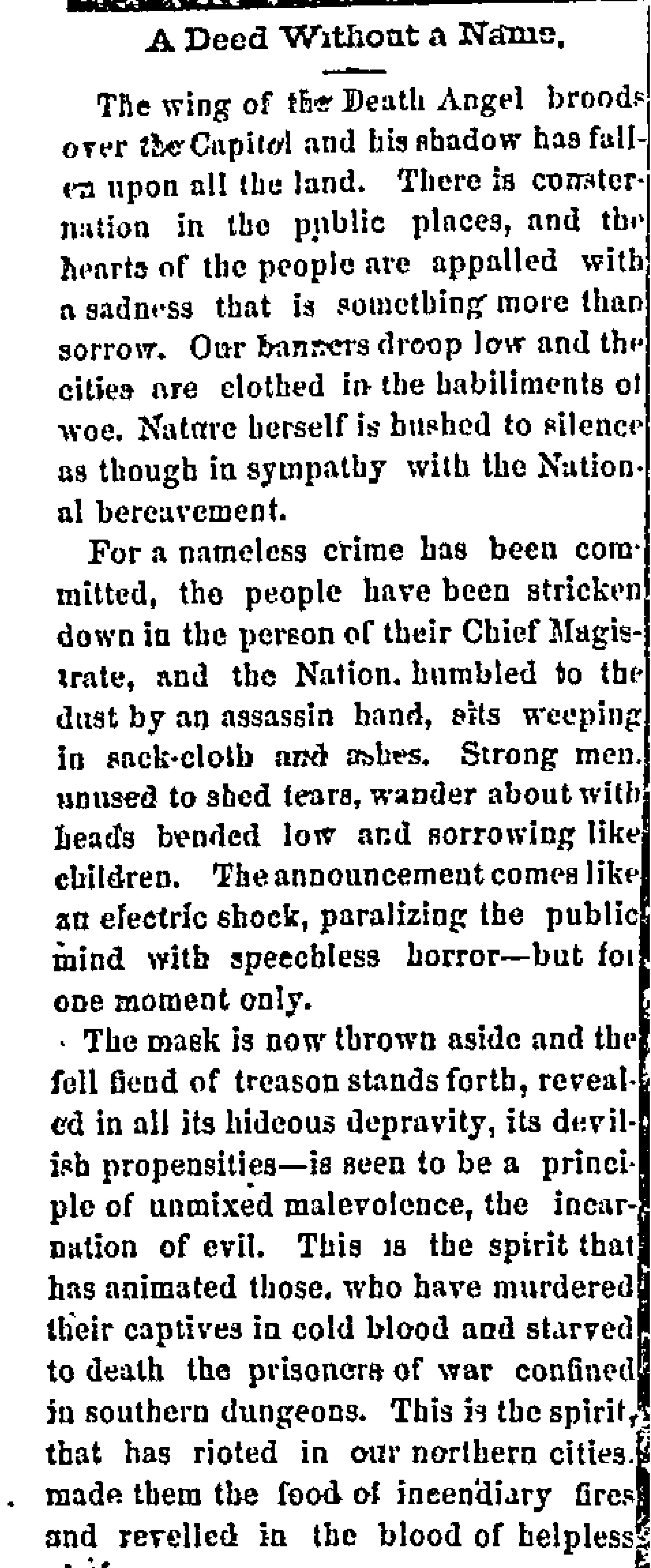
-
Description
This editorial was published in the Union Vedette, a newspaper published by United States soldiers stationed at Camp Douglas in Salt Lake City, Utah. It passionately denounces the perpetrators of the assassination and conveys the shock and sadness felt among the soldiers at Camp Douglas upon receiving news of Lincoln's death. The author condemns not only the conspirators but the Confederacy as a whole, while glorifying Lincoln as the "great Liberator."
-
Source
Utah Digital Newspapers Contributed by McKayla Herron, M.A. Student in Public History, West Virginia University
-
Rights
This item is in the public domain and may be reproduced and used for any purpose, including research, teaching, private study, publication, broadcast or commercial use, with proper citation and attribution.
-
Creator
Union Vedette
-
Publisher
Union Vedette
-
Date
April 17, 1865
from Apr. 19, 1865
"Our Nation Mourning"
-
Full Title
"Our Nation Mourning"
-
Description
This article was published in Salt Lake City's Deseret News on April 19, 1865. It describes the city's initial reaction to the Lincoln assassination, announcing a memorial service to be held in the Latter-day Saint tabernacle, the suspension of business and entertainment throughout the city, and the decoration of public buildings
-
Transcription
Upon the reception of the horrifying intelligence that President Lincoln had been assassinated, throughout the city business was generally suspended, flags were draped in mourning at halfmast, stores and other public buildings were closed and craped, the Management of the Theatre announced that the bill for Saturday evening was postponed to Monday, and deep gloom palpably rested upon the minds of the citizens.
On Sunday the stand and organ in the Tabernacle were clad in the habiliments of woe, as were also many members of the congregation, and Elders W. Woodruf, F.D. Richards and George Q. Cannon delivered feeling and appropriate addresses upon the solemn occasion. Monday evening the proscenium boxes of the Theatre and two large national flags arching from the center over the drop curtain were draped in black.
Alas for the times, when our Chief Magistrate can be stricken down by the hands of an assassin! -
Source
Utah Digital Newspapers Contributed by McKayla Herron, M.A. Student in Public History, West Virginia University
-
Rights
This item is in the public domain and may be reproduced and used for any purpose, including research, teaching, private study, publication, broadcast or commercial use, with proper citation and attribution.
-
Tags
-
Cite this Item
Deseret News. ""Our Nation Mourning" ". Deseret News. Remembering Lincoln. Web. Accessed June 30, 2025. https://rememberinglincoln.fords.org/node/1209
-
Creator
Deseret News
-
Publisher
Deseret News
-
Date
April 19, 1865
from Apr. 19, 1865
"Our Nation Mourning"

-
Description
This article was published in Salt Lake City's Deseret News on April 19, 1865. It describes the city's initial reaction to the Lincoln assassination, announcing a memorial service to be held in the Latter-day Saint tabernacle, the suspension of business and entertainment throughout the city, and the decoration of public buildings
-
Source
Utah Digital Newspapers Contributed by McKayla Herron, M.A. Student in Public History, West Virginia University
-
Rights
This item is in the public domain and may be reproduced and used for any purpose, including research, teaching, private study, publication, broadcast or commercial use, with proper citation and attribution.
-
Creator
Deseret News
-
Publisher
Deseret News
-
Date
April 19, 1865
from Apr. 18, 1865
Office of Agent For C.S. Prisoners
-
Full Title
Office of Agent For C.S. Prisoners
-
Description
Letter sent by a Confederate prisoner of war named WM. S. Hawkins. Hawkins was a Confederate army colonel who was confined to Camp Chase, one of the largest POW camps in the Northern states. Hawkins expresses his regrets in regards to President Lincoln's fate, while voicing a desire for a post-war world in which the country was unified under principles of justice, mercy, and kindness.
-
Transcription
Office of Agent for C.S Prisoners, Camp Chase, Ohio, April, 18th 1865.
I desire, through your columns, to express my profound abhorrence of the deeds resulting in the death of President Lincoln. I wish also to mention that in passing through the prisons, where are still confined several thousand of my comrades, I heard of no one so fallen from the level of our common humanity as to be in any sense gratified at this atrocious murder. The sentiment on every side was that of indignation at so cowardly an attempt, and of regret at its successful completion.
In the name of Right, let the obloquy and the punishment fall in united horror upon the guilty, but not upon men who have had neither part nor lot in the matter; who, in other affairs, may have erred in judgement, but certainly not in heart, since countless sacrifices attest their sincerity; and whose strength, in case of ultimate Federal success, can be merged once more in the common resources far more readily by the Divine policy of brotherly kindness, than by any exercise of bitter and vindictive feeling.
Over the ark of a wise Government two seraphs bend - one of these is clear-eyed Justice, but the other is warm-hearted Mercy.
I am, sirs, very respectfully, your obedient servant,
WM. S. HAWKINS
Colonel, C.S.A. -
Rights
This item is in the public domain and may be reproduced and used for any purpose, including research, teaching, private study, publication, broadcast or commercial use, with proper citation and attribution.
-
Tags
-
Cite this Item
WM. S. Hawkins. "Office of Agent For C.S. Prisoners". The Louisville Daily Journal. Remembering Lincoln. Web. Accessed June 30, 2025. https://rememberinglincoln.fords.org/node/1204
-
Creator
WM. S. Hawkins
-
Publisher
The Louisville Daily Journal
-
Date
April 18, 1865
from Apr. 18, 1865
Office of Agent For C.S. Prisoners
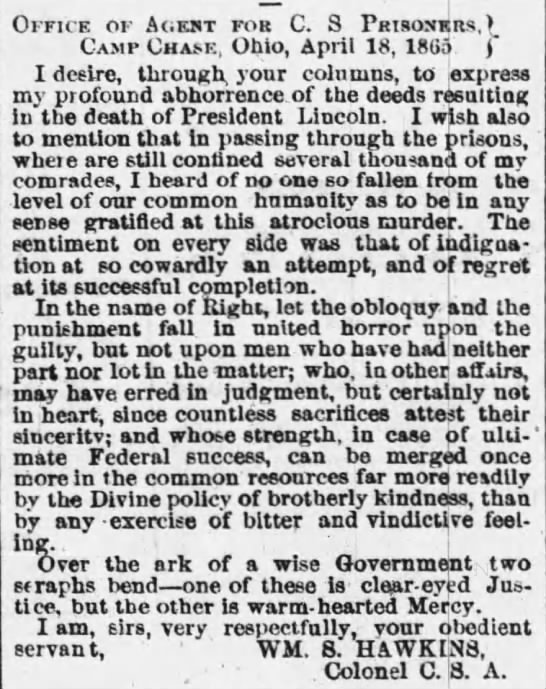
-
Description
Letter sent by a Confederate prisoner of war named WM. S. Hawkins. Hawkins was a Confederate army colonel who was confined to Camp Chase, one of the largest POW camps in the Northern states. Hawkins expresses his regrets in regards to President Lincoln's fate, while voicing a desire for a post-war world in which the country was unified under principles of justice, mercy, and kindness.
-
Rights
This item is in the public domain and may be reproduced and used for any purpose, including research, teaching, private study, publication, broadcast or commercial use, with proper citation and attribution.
-
Creator
WM. S. Hawkins
-
Publisher
The Louisville Daily Journal
-
Date
April 18, 1865
from Apr. 25, 1865
Sir Charles Hastings Doyle to Ulysses S. Grant
-
Full Title
Sir Charles Hastings Doyle to Ulysses S. Grant
-
Description
In this letter from Sir Charles Hastings Doyle, a friend of Ulysses S. Grant and major-general in command of British troops in the Atlantic area, Doyle expresses his sorrow over the assassination of Lincoln. Doyle also goes on to thank Grant for his hospitality while visiting him in Center Point, Virginia and invites Grant and his wife to visit his home in Halifax, Nova Scotia.
-
Transcription
Pray remember me most kindly to Mrs. Grant and all of your staff.
Halifax, Nova Scotia
April 25th, 1865
My Dear General,
I only returned yesterday from the Island of Bermuda, a distant part of my command, and heard, for the first time, on landing, of the glorious termination(for so it may now be called,) of your campaign against Rebeldom, and also the dreadful intelligence of the assassination of the President and attempts to murder both Mr. Seward and his son, which I heard with dismay and sorrow. Each and all of them having treated me with so much kindness upon both occasions of my visiting Washington - There seems to me to be every probability of the recovery of the two latter, and I hope if their lives are spared, you will kindly, when they are well enough to see you, express to them my very sincere condolences upon all the sufferings they have undergone but, the chief cause for my taking up my pen is, to offer you my very sincere congratulations upon your continuous and glorious successes, How much I should have liked to remain another fortnight with you to have been an eye witness of this wind up of your Campaign. You have gained imperishable honor and glory, and I hope you will live to enjoy them for many a long year to come - In conclusion I have only to remind you of your promise to pay me a visit, and to bring Mrs. Grant with you, that I may have an opportunity of repaying, in part at any rate, the kindness and hospitality you so obligingly bestowed upon me - I hope, the campaign being now over, there can be no doubt of your being able to carry your promise into effect - when you are able to make up your mind upon the subject you must let me know, that I may not be absent from home when you come
-Yours Sincerely Hastings Doyle General -
Source
-
Rights
This item is in the public domain and may be reproduced and used for any purpose, including research, teaching, private study, publication, broadcast or commercial use, with proper citation and attribution.
-
Tags
-
Cite this Item
Sir Charles Hastings Doyle. "Sir Charles Hastings Doyle to Ulysses S. Grant". Remembering Lincoln. Web. Accessed June 30, 2025. https://rememberinglincoln.fords.org/node/1130
-
Creator
Sir Charles Hastings Doyle
-
Date
April 25, 1865
from Apr. 25, 1865
Sir Charles Hastings Doyle to Ulysses S. Grant
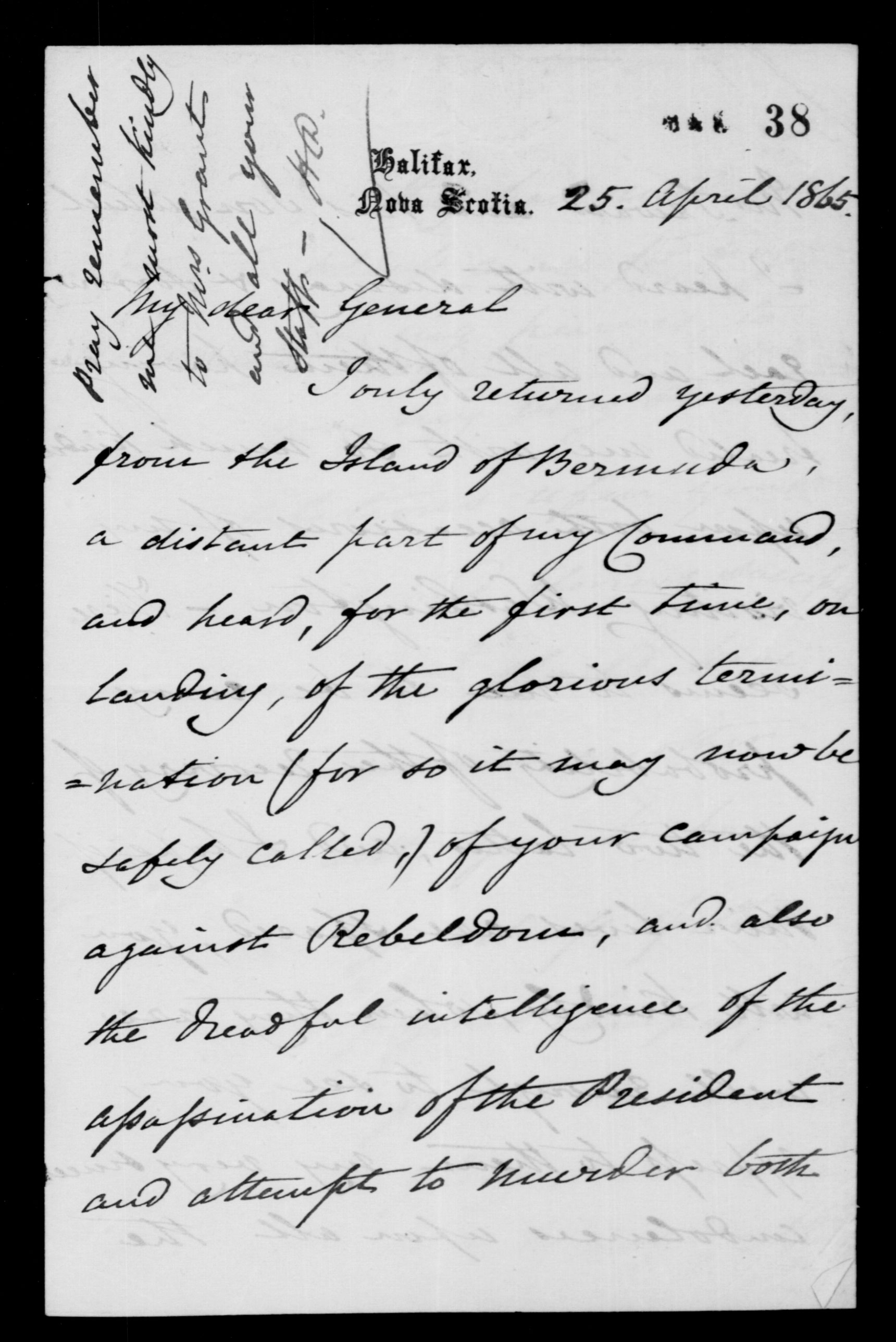
-
Description
In this letter from Sir Charles Hastings Doyle, a friend of Ulysses S. Grant and major-general in command of British troops in the Atlantic area, Doyle expresses his sorrow over the assassination of Lincoln. Doyle also goes on to thank Grant for his hospitality while visiting him in Center Point, Virginia and invites Grant and his wife to visit his home in Halifax, Nova Scotia.
-
Source
-
Rights
This item is in the public domain and may be reproduced and used for any purpose, including research, teaching, private study, publication, broadcast or commercial use, with proper citation and attribution.
-
Creator
Sir Charles Hastings Doyle
-
Date
April 25, 1865
from Apr. 17, 1865
I.F. Quinby to Ulysses S. Grant
-
Full Title
I.F. Quinby to Ulysses S. Grant
-
Description
I.F. Quinby, a former U.S. general teaching at the University of Rochester in 1865, wrote to General Ulysses S. Grant, commander of the U.S. Army, expressing sadness over the assassination of Lincoln. He also shows relief for Grant, who was originally supposed to be the Lincolns' guest at Ford's Theatre the night of the assassination.
-
Transcription
[[?]]Lincolns Assassination Rochester NY
April 17th 1865
General U.S. Grant
My Dear Grant,
While the
whole people are plunged in the
deepest grief at the death of our
wise and most excellent President
there in many led with it a feeling of
thankfulness that you for whom the
same blow was intended, so pro-
[redentially]escaped
Your hopes of the recovery of
Secretary Seward are also realized
The nations soon arise itself
Gone it's almost stupor of grief
and foreboding of other calamities
to forcible in the trace of the will give
place to confidence we the ability
of those at the head of our affairs to
bring alert the peace and hate in all
prosperity whole reserved to well
aroused before the sad event
the people hope news less from you
in the pretense hence you have accomplished
for hence in the name of personal
friendship alone, but in the light of the
nation, where I ask you to take all
wise precautions to guard against
the assassins who may be watching
their oppertunity to strike at your
life.
with the most earnest wishes that
your life may be long passed
to your family and to the nation
I remorse
Sincerely your friend
Quinby
[Transcription by: Joseph Marsteller, Rachel Engl's class, Lehigh University.] -
Source
-
Rights
This item is in the public domain and may be reproduced and used for any purpose, including research, teaching, private study, publication, broadcast or commercial use, with proper citation and attribution.
-
Tags
-
Cite this Item
Isaac Ferdinand Quinby. "I.F. Quinby to Ulysses S. Grant". Remembering Lincoln. Web. Accessed June 30, 2025. https://rememberinglincoln.fords.org/node/1127
-
Creator
Isaac Ferdinand Quinby
-
Date
April 17, 1865
from Apr. 17, 1865
I.F. Quinby to Ulysses S. Grant
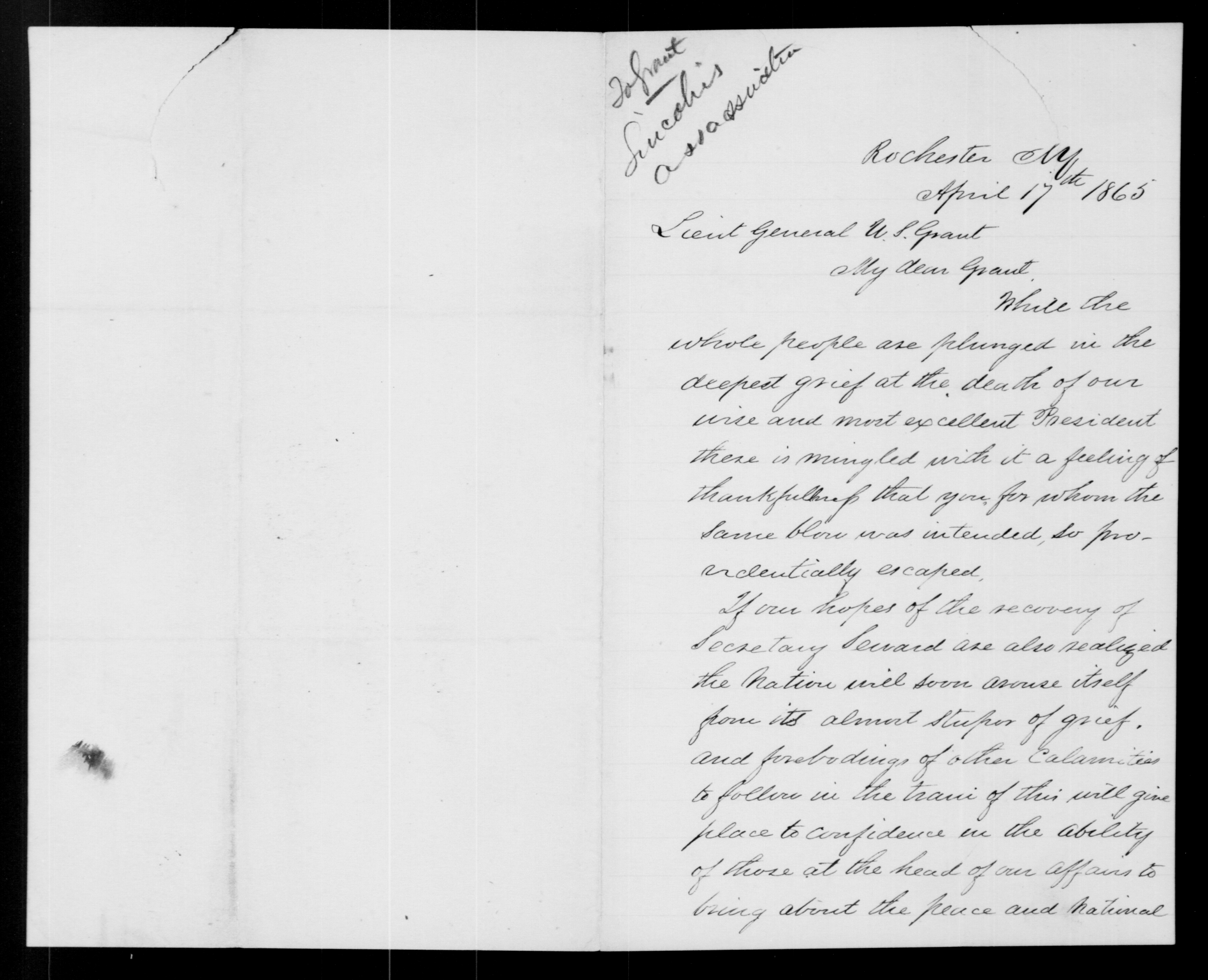
-
Description
I.F. Quinby, a former U.S. general teaching at the University of Rochester in 1865, wrote to General Ulysses S. Grant, commander of the U.S. Army, expressing sadness over the assassination of Lincoln. He also shows relief for Grant, who was originally supposed to be the Lincolns' guest at Ford's Theatre the night of the assassination.
-
Source
-
Rights
This item is in the public domain and may be reproduced and used for any purpose, including research, teaching, private study, publication, broadcast or commercial use, with proper citation and attribution.
-
Creator
Isaac Ferdinand Quinby
-
Date
April 17, 1865
from May. 16, 1865
Department of Foreign Relations and Government - Mexican Response to Lincoln Assassination
-
Full Title
Department of Foreign Relations and Government - Mexican Response to Lincoln Assassination
-
Description
In this official letter from the exiled Mexican government, Sebastián Lerdo de Tejada, the minister of foreign affairs, notifies the United States of their remorse for the death of President Abraham Lincoln. The letter says the Mexican government will fly flags at half mast and wear mourning attire for nine days to honor Abraham Lincoln. Lerdo de Tejada served as second in command to exiled Mexican President Benito Juarez during the "French Intervention" which began in 1861. The French, backed by conservatives and nobility in Mexico, tried to overthrow Mexican President Benito Juarez. Juarez set up his government in exile in northern Mexico, in Chihuahua City, and eventually won the war in 1867.
-
Transcription
Hon. William H. Seward, &c.
_____
[Enclosure No. 1. – Translation.]
[Official.]
DEPARTMENT OF FOREIGN RELATIONS AND GOVERNMENT—DEPARTMENT OF GOVERNMENT, FIRST BUREAU.
[Circular.]
The official confirmation has been received that the President of the United States of America, Abraham Lincoln, died at Washington, at seven o’clock and twenty-two minutes, on the morning of the 15th day of April last, in consequence of the wound inflicted upon him by an assassin at half past nine o’clock on the previous night. The deplorable end of President Lincoln is a cause of great regret to the government of the Mexican republic, and to all its good citizens, by reason of his eminent personal qualities and because, during his administration, the government of the United States has continued in the most friendly relations with that of the Mexican republic in the difficult state of affairs thereof.
With the view that the manifestations of the public sorrow for that end event may be adopted, the citizen President directs that the national flag be hoisted at half-mast upon all the public buildings and at all the military stations during the day subsequent to the reception of this circular, and that all the authorities, functionaries, and employés, both civil and military, clothe themselves in mourning during nine days.
Independence and liberty! Chihuahua, May 16, 1865.
LERDO DE TEJADA
The Citizen Governor of the State of ——— .
[Transcription by: Ricarda H., Dr. Susan Corbesero’s Class, Ellis School, Pittsburgh, Pennsylvania] -
Source
Google Books
-
Rights
This item is in the public domain and may be reproduced and used for any purpose, including research, teaching, private study, publication, broadcast or commercial use, with proper citation and attribution.
-
Tags
-
Cite this Item
Sebastián Lerdo de Tejada. "Department of Foreign Relations and Government - Mexican Response to Lincoln Assassination". Government Printing Office. Remembering Lincoln. Web. Accessed June 30, 2025. https://rememberinglincoln.fords.org/node/1124
-
Creator
Sebastián Lerdo de Tejada
-
Publisher
Government Printing Office
-
Date
May 16, 1865
from May. 16, 1865
Department of Foreign Relations and Government - Mexican Response to Lincoln Assassination
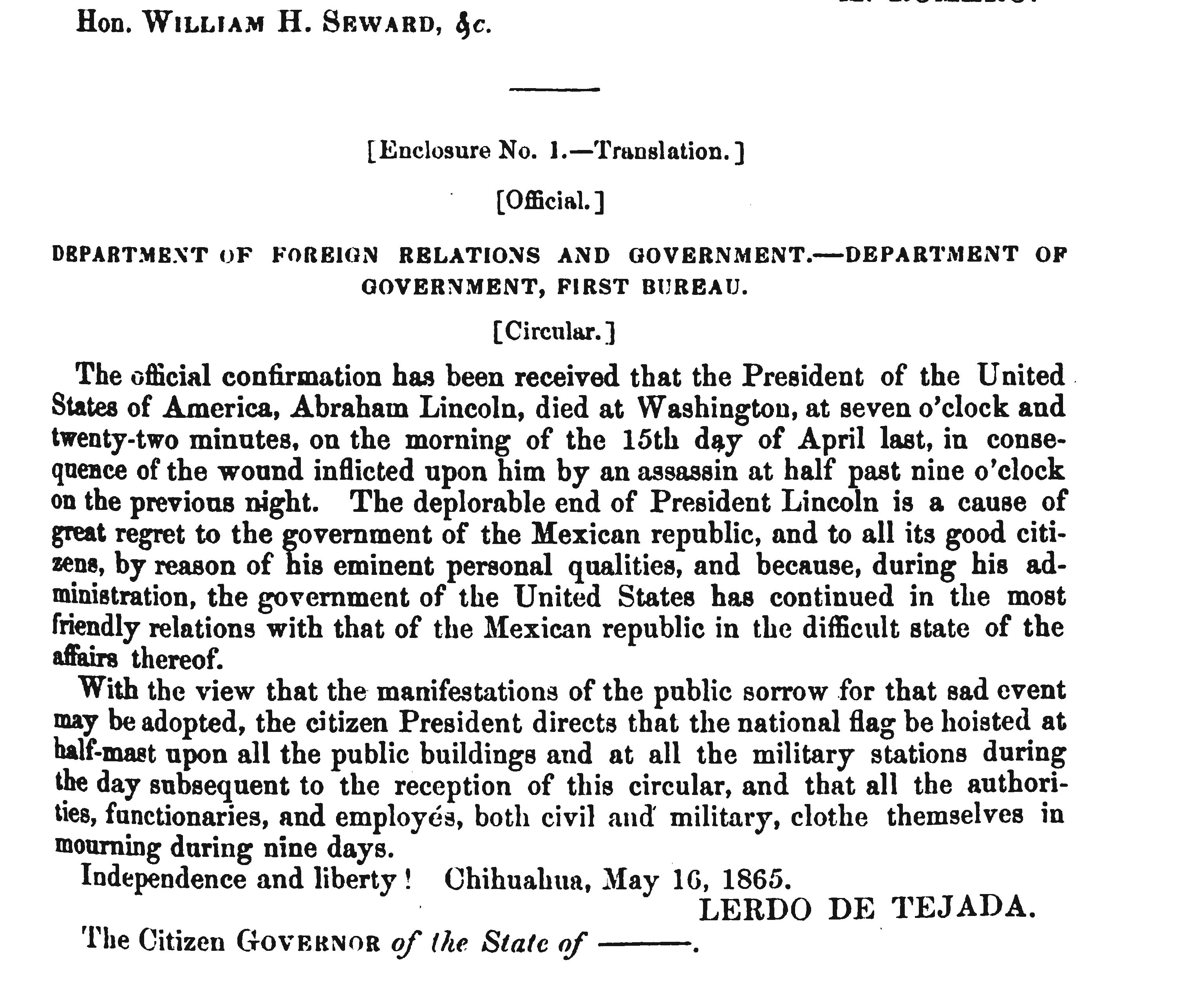
-
Description
In this official letter from the exiled Mexican government, Sebastián Lerdo de Tejada, the minister of foreign affairs, notifies the United States of their remorse for the death of President Abraham Lincoln. The letter says the Mexican government will fly flags at half mast and wear mourning attire for nine days to honor Abraham Lincoln. Lerdo de Tejada served as second in command to exiled Mexican President Benito Juarez during the "French Intervention" which began in 1861. The French, backed by conservatives and nobility in Mexico, tried to overthrow Mexican President Benito Juarez. Juarez set up his government in exile in northern Mexico, in Chihuahua City, and eventually won the war in 1867.
-
Source
Google Books
-
Rights
This item is in the public domain and may be reproduced and used for any purpose, including research, teaching, private study, publication, broadcast or commercial use, with proper citation and attribution.
-
Creator
Sebastián Lerdo de Tejada
-
Publisher
Government Printing Office
-
Date
May 16, 1865
from May. 11, 1865
Mexican President Benito Juarez Response to the Lincoln Assassination
-
Full Title
Mexican President Benito Juarez Response to the Lincoln Assassination
-
Description
This is a condolence letter from the exiled Mexican President Benito Juarez. In the letter Juarez mourns the loss of Abraham Lincoln and also hopes that the U.S. Secretary of State and his son recover from their wounds. On the night of President's assassination, U.S. Secretary of State William Seward was also attacked. He was stabbed repeatedly in his home by conspirator Lewis Powell. Eventually Seward recovered from his wounds. Benito Juarez served as President in Mexico until 1863, when French forces invaded Mexico during the "French Intervention" which began in 1861. The French, backed by conservatives and nobility in Mexico, tried to overthrow Mexican President Benito Juarez. Allies of Juarez fled to New York City, considered a safe haven by Mexican liberals. Juarez set up his government in exile in northern Mexico, in Chihuahua City.
-
Transcription
Hon. William H. Seward, &c.
_____
[Enclosure No. 1. – Translation.]
Chihuahua, May 11, 1865.
My Dear Friend …
We also received the day before yesterday the news of the total defeat of the confederate army on the 9th of April. The great pleasure this news afforded us was marred by the very sad impression which the shocking intelligence of President Lincoln’s assassination produced upon us. That great misfortune has profoundly impressed me, as Mr. Lincoln, who worked with so much earnestness and abnegation for the cause of nationality and freedom was worthy of a better fate than the poniard of a coward assassin. I do most earnestly hope that Mr. Seward’s wounds would not be mortal, and that his son too, may have been saved. I beg of you to pay a private visit to Mr. Seward in my name, expressing to him my grief for the misfortunes befallen upon him, and my best wishes for his speedy and complete recovery.
Benito Juarez
Senor Don Matias Rombro
[Transcription by: Ricarda H., Dr. Susan Corbesero’s Class, Ellis School, Pittsburgh, Pennsylvania]
-
Source
Google Books
-
Rights
This item is in the public domain and may be reproduced and used for any purpose, including research, teaching, private study, publication, broadcast or commercial use, with proper citation and attribution.
-
Tags
-
Cite this Item
Benito Juarez. "Mexican President Benito Juarez Response to the Lincoln Assassination". Government Printing Office. Remembering Lincoln. Web. Accessed June 30, 2025. https://rememberinglincoln.fords.org/node/1123
-
Creator
Benito Juarez
-
Publisher
Government Printing Office
-
Date
May 11, 1865
from May. 11, 1865
Mexican President Benito Juarez Response to the Lincoln Assassination
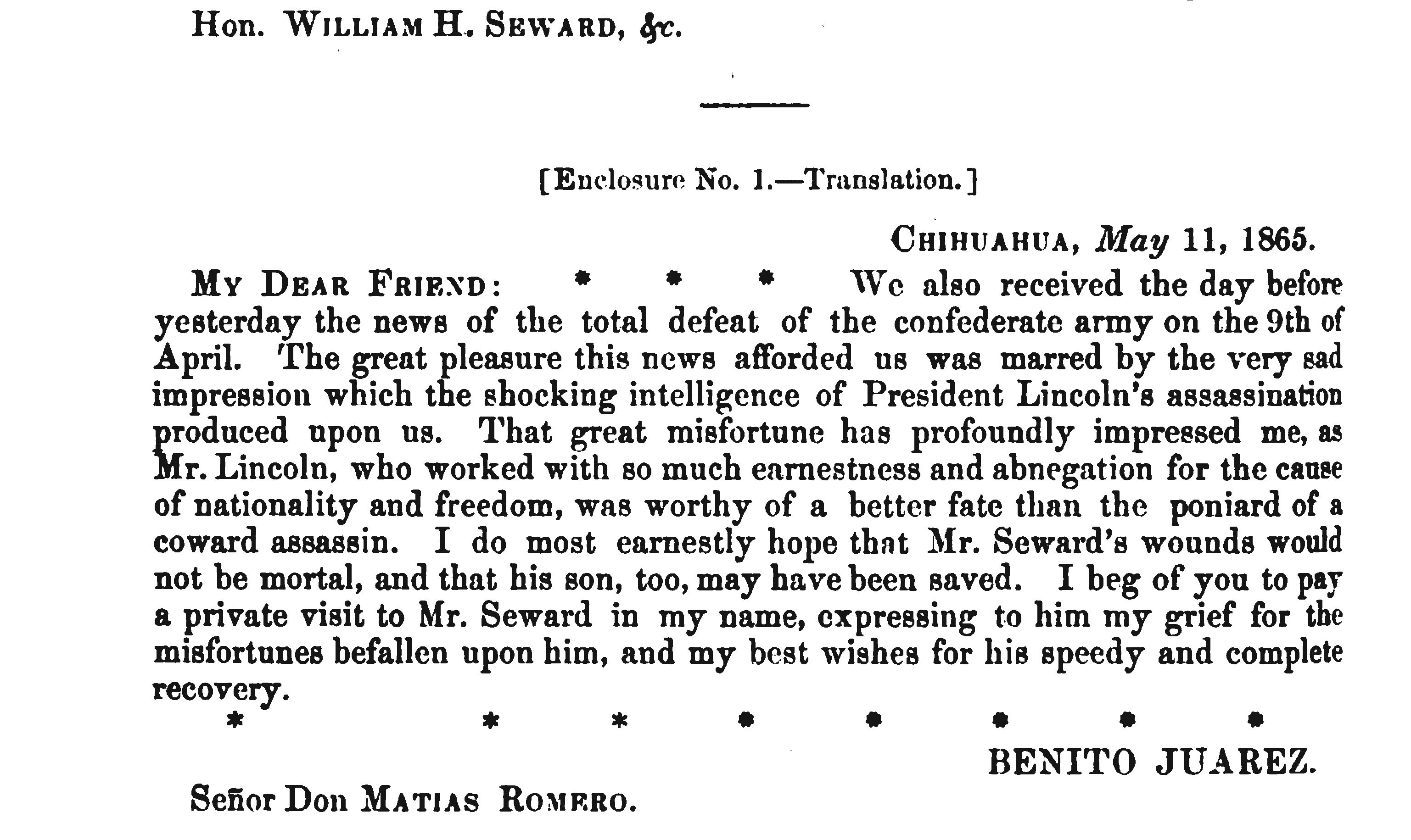
-
Description
This is a condolence letter from the exiled Mexican President Benito Juarez. In the letter Juarez mourns the loss of Abraham Lincoln and also hopes that the U.S. Secretary of State and his son recover from their wounds. On the night of President's assassination, U.S. Secretary of State William Seward was also attacked. He was stabbed repeatedly in his home by conspirator Lewis Powell. Eventually Seward recovered from his wounds. Benito Juarez served as President in Mexico until 1863, when French forces invaded Mexico during the "French Intervention" which began in 1861. The French, backed by conservatives and nobility in Mexico, tried to overthrow Mexican President Benito Juarez. Allies of Juarez fled to New York City, considered a safe haven by Mexican liberals. Juarez set up his government in exile in northern Mexico, in Chihuahua City.
-
Source
Google Books
-
Rights
This item is in the public domain and may be reproduced and used for any purpose, including research, teaching, private study, publication, broadcast or commercial use, with proper citation and attribution.
-
Creator
Benito Juarez
-
Publisher
Government Printing Office
-
Date
May 11, 1865
from Apr. 15, 1865
Condolences from the Mexican Club of New York
-
Full Title
Condolences from the Mexican Club of New York to Secretary of State William Seward
-
Description
This is a condolence letter from the Vice President of the Mexican Club of New York to the U.S. Secretary of State William Seward after news of Abraham Lincoln's assassination reached New York. The letter talks about how important President Lincoln was to the ideals of liberty and freedom in the United States and reaffirms Mexico's commitment to their friendship with the country. The Mexican Club of New York was created in 1864, as exiles from the Mexican government fled Mexico during the French Intervention, which began in 1861. The French, backed by conservatives and nobility in Mexico tried to overthrow Mexican President Benito Juarez. Allies of Juarez fled to New York City, considered a safe haven by Mexican liberals. U.S. Secretary of State William Seward quietly supported the work of the Club but refused to promise too more nor interfere with the war in Mexico. The Club's president, Benito Quijano, had died in early 1865 and at the time of Abraham Lincoln's death a new successor had not been chosen.
-
Transcription
Republic of Mexico
[Enclosure No. 2 – Translation.]
Mexican Club at New York.
New York, April 15, 1865.
Sir: The Mexican Club of New York, profoundly affected by the tragic and premature death of the President of the United States, Abraham Lincoln, has resolved to manifest to your excellency that the citizens which compose it fully sympathize the affliction of the American people; that they look upon the loss of this eminent patriot not only as a great calamity to the United States, but as a just cause of mourning for all the peoples who in America enjoy liberty, or are contending to restore it; and they believe that with Lincoln there has disappeared from earth one of the great benefactors of humanity, who, on descending to the tomb, has been crowned with the laurel of immortality and martyrdom.
To the veneration which Lincoln will have in history, as the personification of the great American people, in his firmness, in his energy, in his enlightenment, and in his magnanimity, to his great title of the emancipator of the slaves, he will always add in the hearts of the Mexicans the acknowledgement which the love of justice and the respect for law inspires, of which he gave proofs, in not sanctioning the outrages committed against Mexico, and in not acknowledging in that republic any other power than that which is derived from the institutions and the free national will.
The Mexican Club, in taking part in the affliction of the people of the United States, upon whom it looks as a nation of brothers, cherishes the hope that as the spirit of Washington has animated this nation in the work of consolidating its institutions, so the spirit of Lincoln may continue to guide it until peace and union are restored, slavery abolished, and until it shall become the bulwark of liberty for all America.
On addressing this manifestation to your excellency, we have the honor to offer to you the assurances of our very distinguished consideration.
In absence of the president, from indisposition,
IGNACIO MEJIA, Vice President.
CIPRIANO ROBERT, Secretary.
Hon. Secretary of State of the United States.
[Transcription by: Ricarda H., Dr. Susan Corbesero’s Class, Ellis School, Pittsburgh, Pennsylvania] -
Source
Google Books
-
Rights
This item is in the public domain and may be reproduced and used for any purpose, including research, teaching, private study, publication, broadcast or commercial use, with proper citation and attribution.
-
Tags
-
Cite this Item
Ignacio Mejia. "Condolences from the Mexican Club of New York to Secretary of State William Seward". Government Printing Office. Remembering Lincoln. Web. Accessed June 30, 2025. https://rememberinglincoln.fords.org/node/1122
-
Creator
Ignacio Mejia
-
Publisher
Government Printing Office
-
Date
April 15, 1865
from Apr. 15, 1865
Condolences from the Mexican Club of New York to Secretary of State William Seward
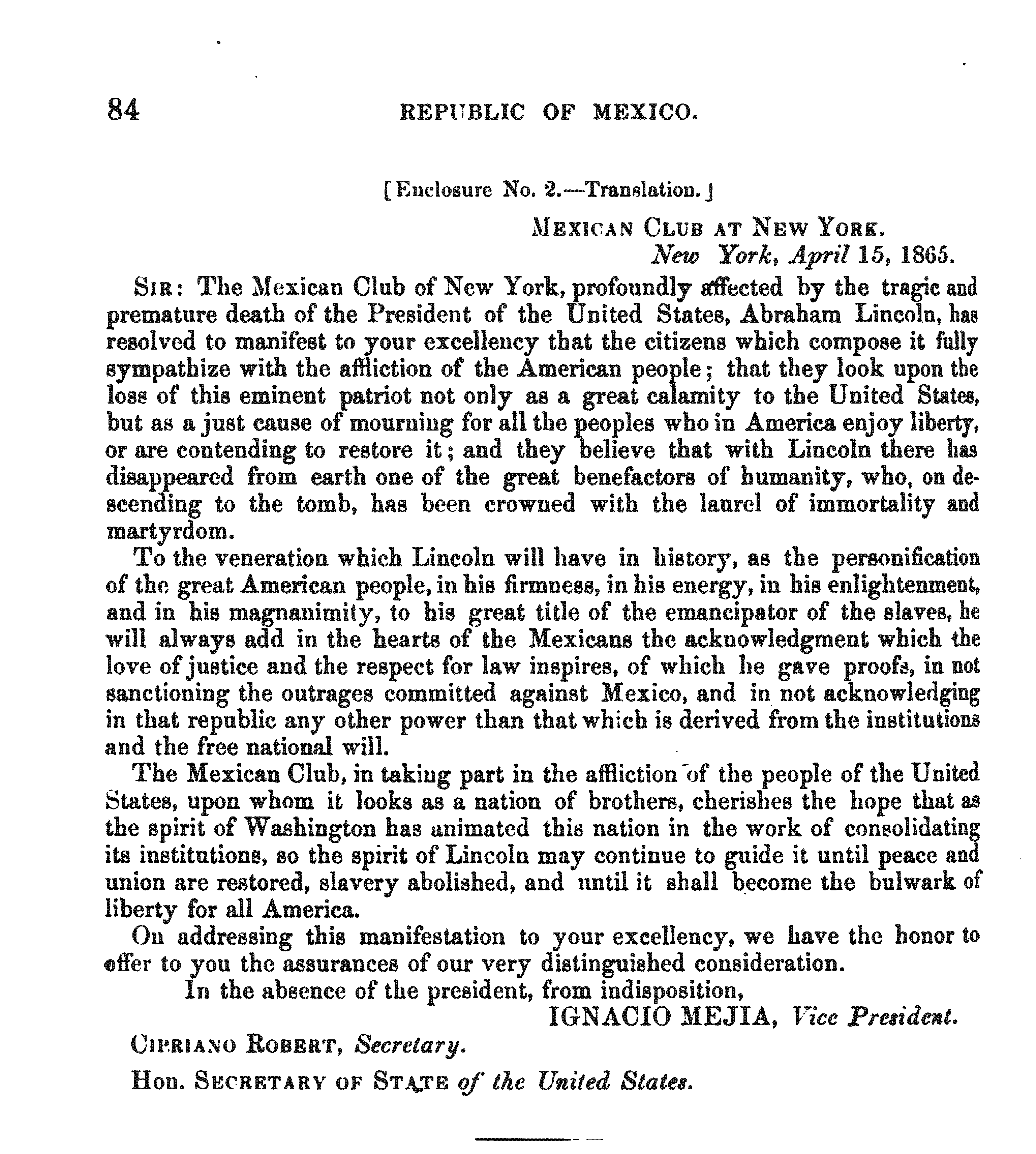
-
Description
This is a condolence letter from the Vice President of the Mexican Club of New York to the U.S. Secretary of State William Seward after news of Abraham Lincoln's assassination reached New York. The letter talks about how important President Lincoln was to the ideals of liberty and freedom in the United States and reaffirms Mexico's commitment to their friendship with the country. The Mexican Club of New York was created in 1864, as exiles from the Mexican government fled Mexico during the French Intervention, which began in 1861. The French, backed by conservatives and nobility in Mexico tried to overthrow Mexican President Benito Juarez. Allies of Juarez fled to New York City, considered a safe haven by Mexican liberals. U.S. Secretary of State William Seward quietly supported the work of the Club but refused to promise too more nor interfere with the war in Mexico. The Club's president, Benito Quijano, had died in early 1865 and at the time of Abraham Lincoln's death a new successor had not been chosen.
-
Source
Google Books
-
Rights
This item is in the public domain and may be reproduced and used for any purpose, including research, teaching, private study, publication, broadcast or commercial use, with proper citation and attribution.
-
Creator
Ignacio Mejia
-
Publisher
Government Printing Office
-
Date
April 15, 1865
from Apr. 19, 1865
The Feeling in Canada
-
Full Title
The Feeling in Canada
-
Description
In this article the emotions of the nation following the death of Abraham Lincoln can be seen in great detail. The aspects of his noble character that won over the public are also mentioned frequently. There is even discussion of why the assassin committed this horrendous deed before questioning why John James Booth killed assassinated the president. His mental health is also questioned
-
Transcription
THE FEELING IN CANADA
________
Opinion of the Leading Canadian Journal—The Deep Regard and Affection Felt forThe President—The Secessionists Carousing in Honor of the Assassin—A Plea for The Murderer—His Crime Justified.
From the Toronto Globe.
ABRAHAM LINCOLN.
At twenty-two minutes after seven o’clock, on Saturday morning, about nine hours after he had received the shot of the assassin, ABRAHAM LINCOLN drew his last breath, surrounded by the members of his family, his Cabinet, and leading political and personal friends. His death would, under any circumstances, have produced an extraordinary sensation, but accompanied by murderous violence, the feeling which has been created has been the most intense. No single event of the present century in America can at all compare with it in effect on the popular mind, and we think that in England the shock will be nearly as deeply felt. The grief which is expressed has two very distinct origins, the stronger of which seems to arise from personal sympathy and regard for the deceased. We hear in all quarters the strongest expressions of admiration of the character of Mr. LINCOLN, and deep sorrow that his noble career should have been brought to an untimely end. His simplicity of charafter [character[, his straightforward honesty, his kindliness, even his bluntness of manner, seem to have won the popular heart, even among a foreign, and, in matter of opinion, a hostile nation. We may judge by that fact of his popularity among the citizens of the Northern States. Almost all of us feel as if we had suffered a personal loss. Mr. LINCOLN is spoken of in the same terms as are used toward a familiar friend. All mourn his untimely fate. He had risen by industry, ability and integrity to the great position of Chief Magistrate of his country. He found it in the most imminent danger, and his power to control the elements which were sweeping over the land were far from generally acknowledged. He was regarded with fear and trembling by the friends of his government, and with contempt by his opponents. But steadily he made his way. He was not the best man who could have been imagined for the post of Chief Magistrate in a great civil war. He had not the commanding force which infuses energy into all around him, and his public appearances were often lacking in dignity. But he was sagacious, patient, prudent, courageous, honest and candid. If he did not inspire great Generals, he gave every man in the army an opportunity of developing the talents within him. He recognized merit and rewarded it. He placed confidence, as a rdle [rule], where it was due, and he had his reward in great military successes. Some say that he has been cut off at a favorable moment for his reputation but we cannot accept this view. It seems to us that he had gone through his worst trials, that his patience, sagacity and honesty would have borne even better fruits in the settlement of the affairs of the South than during the wild commotion of the war. He has been cut off at a time when, certainly, he had accomplished a great deal, but leaving much undone which he was well qualified to do. A naturally strong man, of only fifty-six, he might have hope to live many years after finishing his work as President, in the enjoyment of the respect and admiration justly due to one who had saved the life of his country. He will be held, we think, by Americans, if not equal to WASHINGTON, second to none but he. But he had not the gratification of his great predecessor, of seeing his work completed and enjoying for a long period the gratitude of his countrymen and the admiration of strangers. There are few so hard of heart as to not shed a tear over the sudden and bloody termination of so bright a career. As great as WASHINGTON in many moral and mental qualities, his genial character was calculated to win far more popular sympathy than his predecessor. Ability and honesty all admire, but when to them are added kindliness, simplicity, and freedom from selfishness, haughtiness and pride in high position, they win love as well as respect.
THE MURDER JUSTIFIED
From the Toronto Leader
A man may, on the spur of the moment, be so maddened with rage as to strike another down to the earth; but if the accounts which come to us of this distressing affair are correct, the attack upon both Mr. LINCOLN’s and Mr. SEWARD’s lives were concocted some time prior to the inauguration ceremony on the 4th of March, and only failed of accomplishment because one of the parties in the plot lost heart to carry out the scheme at that time. Would that he had never found it again! The act was not committed without due time for reflection as to its awful nature. For over a month the plan remained unacted upon in the bosom of its author, and time seems but to have added to the burning desire to carry it out. There must have been a strong feeling on the part of the person who committed the crime that a grievous wrong had been done, either to himself or to his country, by the President or the government he represented. Had a Southern man, during the four years of the war, taken the life of the President, there would be no difficulty in tracing it to a cause. We cannot so soon forget the numberless acts of wickedness committed in the South by the servants and emissaries of the Northern Government; the beautiful homesteads leveled to the ground with demoniacal fury; the fair women violated by a ribald soldiery; the brave men shot down in the coldest blood on the insane plea of retaliation—all this and much more is still fresh in our memories, and serve to remind us that if the assassination had been committed in the heat of the war by a Southern man, who had so much to drive him to desperation, a reason for his conduct could readily be found. In the present instance these considerations do not help us to discover the cause of the assassination. That the deed was committed by JOHN WILKES BOOTH, a brother of EDWIN BOOTH, the celebrated actor of the present day, there seems to be little doubt. But why should he make himself the champion of the Southern people or the Southern cause? He must have been goaded almost to the verge of madness. No man of ordinary nerve or trivial impulse could have jumped into a private box at the theatre, as he did, calmly shoot down the object of his wrath, then spring on the stage uttering words which serve to give a clue to the act of assassination, and ultimately find his way through the theatre to a place of escape. The man who could have done all this, must have considered that his chances of escape were very few indeed, and that, if need were, he was ready to give up his own life for that which he had taken. There is desperation in such a thought—such a desperation as is caused by a deep consciousness of wrong-doing on the part of the persons against whom it is conceived.
The feeling in Montreal
MONTREAL, Tuesday, April 18.
The following proclamation has been issued by the Mayor of Montreal:
PROCLAMATION.
Whereas Wednesday next, the 19th of April inst., at noon, has been fixed upon for the funeral ceremonies of the Chief Magistrate of the United States, the undersigned, Mayor of the City of Montreal, respectfully invites the citizens generally to close their places of business from 12 o’clock noon on that day, as a tribute of respect to the memory of the late President of the United States, and of sympathy with the bereaved members of his family, and also as an expression of the deep sorrow and horror felt by the citizens of Montreal at the atrocious crime by which the President came to an untimely death.
(Signed) J. L. BEAUDRY, Mayor
Arrival of Gen. Lee in Richmond.
The Richmond Whig of yesterday says:
Gen. R. E. LEE arrived in this city about 3 o’clock Saturday evening, attended by five members of his staff. He rode into the city over the pontoon bridge at the foot of Seventeenth-street, and thence up Main-street to his residence on Franklin-street between Seventh and Eighth-streets.
[Transcription by: Deborah Taylor.] -
Source
THE FEELING IN CANADA. (1865, Apr 19). New York Times (1857-1922) Retrieved from http://blume.stmarytx.edu:2048/login?url=https://search.proquest.com/docview/92001549?accountid=7076
-
Rights
This item is in the public domain and may be reproduced and used for any purpose, including research, teaching, private study, publication, broadcast or commercial use, with proper citation and attribution.
-
Tags
-
Cite this Item
Toronto Globe . "The Feeling in Canada". New York Times. Remembering Lincoln. Web. Accessed June 30, 2025. https://rememberinglincoln.fords.org/node/1120
from Apr. 19, 1865
The Feeling in Canada

-
Description
In this article the emotions of the nation following the death of Abraham Lincoln can be seen in great detail. The aspects of his noble character that won over the public are also mentioned frequently. There is even discussion of why the assassin committed this horrendous deed before questioning why John James Booth killed assassinated the president. His mental health is also questioned
-
Source
THE FEELING IN CANADA. (1865, Apr 19). New York Times (1857-1922) Retrieved from http://blume.stmarytx.edu:2048/login?url=https://search.proquest.com/docview/92001549?accountid=7076
-
Rights
This item is in the public domain and may be reproduced and used for any purpose, including research, teaching, private study, publication, broadcast or commercial use, with proper citation and attribution.
-
Creator
Toronto Globe
-
Publisher
New York Times
-
Date
April 19, 1865
from Apr. 29, 1865
Letter from L.D. Bradley to Minnie Bradley
-
Full Title
Letter from L.D. Bradley to Minnie Bradley
-
Description
Letter from L. D. Bradley to Minnie Bradley, dated April 29, 1865 and sent from Galveston, in which he writes about his concern for her health, mentions the death of President Lincoln and his presumptions about its effect on the war.
-
Transcription
Galveston, April 29th 1865,
Jimmy McIlveen,
Taz Watson
Jim Blackmon
Little Honey(?),
Since writing to you I have received your letters of the 9th, 13th & 16th of April; the two first arrived two or three days since, the last, this evening. I have been very uneasy about the baby; your letter received this evening, however, somewhat, though not entirely, reassures me. I am becoming a good deal uneasy about you also Little Darling; in your other letters you mention that you have had for some time a very troublesome cough; in the last one, you say you have quite a severe pain in the shoulder and breast. Little Honey, my own darling little wife, you must take more, and better, care of yourself. I knew perfectly well your disposition to worry, and do all the work about the children yourself; to get up in the night to wait upon them &c; now that must be stopped. You ought to recollect, Little Honey, that with me it is exactly as if I had no one in the world to love, or be loved by, but yourself. It is very true that I love the children, but, Little Darling, when I think of you in comparison with any one, or all, others, it seems to me that you are my “all in all”. I have commenced writing back(?) this evening, on account of having just received your letter, & having some leisure time, but do not expect to finish until to-morrow; Jimmy McIlveen & Taz Watson start up on Monday, that is day after to-morrow, and I will send this letter by one of them. By the way, Little Honey, two or three of the company have come from home recently, all of whom say that they saw your father in town about the time they were starting, & still no letter from you by any of them. I know perfectly well that it is not your fault, but then I would like to know the reason for it. There is no late news of interest except what you have probably learned through the papers. Lincoln & Seward being killed seems to be regarded as a kind of offset to the surrender of Lee & his army. The number surrendered by Lee has settled down to something less than 12,000, and they seem to have been mostly detailed men, reserves &c; if such is the case they are but very little loss. The loss in machinery, stores &c, however, was very large; for the Confederates, it was immense; and one which will not be easily recovered from. I have not a particle more of doubt as to the result of this war now, then I had three years ago, or at its commencement; I think however it is fast tending towards a guerrilla arrangement, In some respects that would suit me very well; there would then be no dodgers or shirkers; every body would have to be on one side or the other; and, best of all, I think it would take but a very short time for guerrillas to make a clean riddance of Speculators, extortioners, and all the other species of the [illegible] kind, who have been infesting the confederacy. On the other hand, it would be terrible on women & children, and in that I am particularly interested. There is one thing however very certain; if events do turn out in that way; wherever I may go, & in whatever I may engage, I shall always keep you very near to me. But I will not endeav-er not to anticipate any thing further, of a gloomy character; it is bad enough any how; without the trouble of anticipating. I have just heard of Jim Blackmon’s death; very bad is it not? It was very unexpected also, for the last news received from him was that he would probably, by this time, have been exchanged. In fact I was fully expecting to hear of his being at home, instead of his death. I will close now, Little Honey, until to-morrow. I have been a little sick for a day or two; a very bad cold, discrelined system &c, which makes me feel more gloomy than I would otherwise be; by to-morrow however I hope to be not only in better health, but better spirits.
April 30th 1865
Little Darling –
There is nothing more in the way of news today than there was yesterday; Some runners, but no reliance placed in them. One is that President Andy Johnson & Stanton, the Federal Sec’y of War, have been assassinated; another, that Genl Joe. Johnston has whipped Sherman, being good, both of them, if true. If the game of killing the U.S. Presidents is properly kept up, it will soon be so that no one will accept the position; that will probably produce so much confusion, and in fact, anarchy, it will interfere very much with their proper administration of affairs, and therefore give us a much better chance in this war. As a general thing, I am very much opposed to assassination, but when it comes to killing such men as Lincoln, Johnson, Seward &c, men who have been the cause of slaughtering thousands of our best people, and who have made desolate thousands of homes in the Confederacy, I approve it very highly; for they deserve death richly, and as they do not expose themselves to any of the dangers of battle, &c, which they im-pose upon others, I think it a very proper plan to kill them in any manner whatsoever in which it can be accomplished.
I am not getting along quite as well as usual; I have been about half sick for two or three days, & don’t appear to be getting over it. I can sympathize with you as to the cough you complain of; for I do considerable coughing myself. I think though, that in a day or two I will be entirely well. I have a piece of calico to make me a shirt, which I will send to you by the first practicable opportunity. Say to Bobolinks that I received her letter, and will write her one in a very few days. Isn’t it a delightful childs letter, Little Honey; just exactly the way she talks. Kiss the children for me Little Darling and, please mam, try to take good care of yourself. Write frequently. [illegible]
[Transcription by: Rodney Peacock]
-
Source
Pearce Museum at Navarro College via The Portal to Texas History
-
Rights
This item is in the public domain.
-
Tags
-
Cite this Item
L.D. Bradley. "Letter from L.D. Bradley to Minnie Bradley ". Remembering Lincoln. Web. Accessed June 30, 2025. https://rememberinglincoln.fords.org/node/1119
from Apr. 29, 1865
Letter from L.D. Bradley to Minnie Bradley
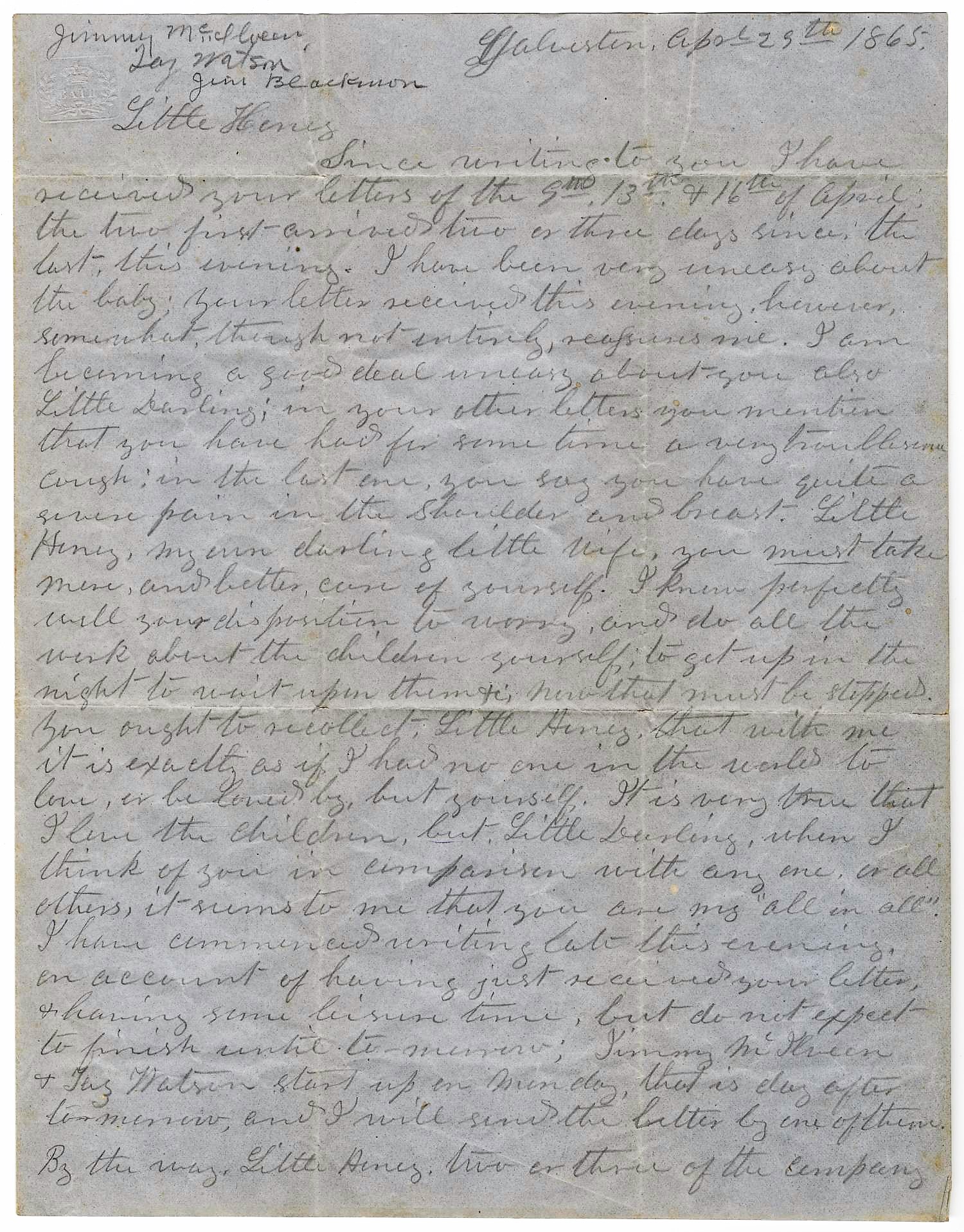
-
Description
Letter from L. D. Bradley to Minnie Bradley, dated April 29, 1865 and sent from Galveston, in which he writes about his concern for her health, mentions the death of President Lincoln and his presumptions about its effect on the war.
-
Source
Pearce Museum at Navarro College via The Portal to Texas History
-
Rights
This item is in the public domain.
-
Creator
L.D. Bradley
-
Date
April 29, 1865
-
Dimensions
[4] p. ; 27 cm
